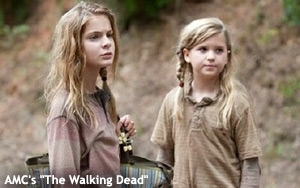
AMC’s “The Walking Dead” last night served up a storyline unlike any I can recall in a lifetime of television watching. There may have been something like it somewhere along the
way in NBC’s unflinchingly gritty “Law & Order: Special Victims Unit” or in a cheesy made-for-television movie, especially on Lifetime, but nothing comes to mind.
Before I get into it, if you haven’t seen last night’s episode or read anything about it or learned anything about it from water-cooler buzz or social media conversation -- and I’m
not sure how that’s possible at this point, given the enormity of this show’s audience and the immediacy of its impact on the Web -- then you might consider saving this column for another
day.
The perpetual output of violence against adult human beings on television is one thing, whether graphically depicted or revealed in horrific aftermath or off-screen details. But the depiction
of brutal violence inflicted on children is quite another. It’s relatively rare, given the overall magnitude of television violence and its steady inclusion in so many ongoing series. So when an
episode of a series focuses on it, especially in the surprising way that “The Walking Dead” did last night, it’s enough to break through the clutter and give pause to even the most
hardened television watcher.
advertisement
advertisement
Once upon a time the earth would have cracked in two if a television program did what “The Walking Dead”
did last night. Certainly, it would have been flagged as the most monstrous hour of television of the year, if not ever; there might even have been protests about it. In this instance, however, the
horror of the sequences in question and the impact on the audience goes beyond our unsettling comfort with violence to the profound dramatic strength of this series. It’s supposed to be a zombie
monster show, for crying out loud, but now and again it forces its audience to look at it as something else entirely.
And so it is that when Carol and Tyreese came back to their temporary (and
seemingly idyllic) home only to discover emotionally unstable tween Lizzie standing over the dead body of her adoring kid sister Mike, bloody knife in hand and baby Judith her intended next target,
the impact of the moment went beyond shock and horror to one of deep emotional complication. What prompted Carol and Tyreese to leave Mika and Judith alone with Lizzie, whose behavior had become
increasingly erratic? What finally pushed Lizzie to stab her sister to death and wait to watch her rise as a walker? Why would she want to do the same to Judith? Why couldn’t Lizzie get it
through her head that walkers weren’t people, as she continued to insist, but fiendish monsters intent only on hurting her?
All at once viewers were made to see a sweet child that had
been violently killed by the person she loved and trusted the most, another child with blood on her hands ready to kill again and a baby in dire peril -- any of it more horrifying than anything any
zombie has ever done on this series. This is why “The Walking Dead” is television’s hottest and most powerful show: It repeatedly dares to go there, but does so in ways that prompt
the audience to ponder time and again what they would do in certain situations and why they would behave the way they did.
Some critics complain that “The Walking Dead” has run out
of gas. An episode like the one last night proves that it not only has a full tank, but that the tank has been topped off with hi-test. If anything, the story told last night was long overdue:
We’ve seen what the zombie apocalypse has done to young Carl, arguably the smartest of the survivors on the show, but we have never seen the obvious toll it would take on a child who
couldn’t cope with such extreme horror and shouldn’t be expected to. Lizzie clearly had psychological issues before the rise of the dead, but her experiences since proved too much for her
to process. That’s as realistic an approach to characterization on this show as any other.
And then there’s Carol -- like Carl much smarter in her understanding that the world they
are living in now is not the world they knew then, and that nobody is going to survive if they insist on behaving like the old rules apply. Carol’s decision to kill Lizzie, now a deadly threat
to little Judith and everyone else, came from bravery and, in a sense, self-sacrifice.
The scene that followed, in which Carol, played by Melissa McBride, confessed to Tyreese (Chad Coleman)
that she killed Karen and David when they were infected by the virus in the prison -- to put them out of their misery and ensure that the virus wouldn’t be further spread, at least not by them
-- was a showcase for the two actors involved. McBride was especially impressive, manifesting in every expression and every word the burden she would forever carry after killing three people,
including a child; the feelings of loss she still carries after the death of her daughter Sophia, and the overall hopelessness and emptiness that comes with the understanding that the life they are
now living demands that they do terrible things.
Any doubts as to the impact of this hour were immediately eradicated when “Walking Dead” ended and “Talking Dead”
began. Host Chris Hardwick and his guests, including Melissa McBride, had also been watching the show and they were clearly as shaken up by it as any viewer who did not have ice water running through
his or her veins. I’m looking forward to the return of “Mad Men” to AMC’s Sunday night schedule on April 13, but I’m going to miss “Walking Dead” when its
current season comes to a close in two weeks.